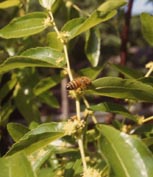 |
Jujube, Chinese Date (Ziziphus jujuba Mill). A major honey plant in China where orchards are abundant, the jujube is only sparingly naturalized from occasional dooryard plantings in the southeastern U.S. The nectar is sucrose-dominant and very rich (40% w/v sugars). In the afternoon when jujube secretes nectar, it becomes a veritable insectarium: we observed 18 families of insects within a single two-hour period on a single tree. It is not a pollen source and the nectar contains an alkaloid that is somewhat poisonous to bees ("date flower disease"). Normal orchard yields are 25-55 lbs of honey over a 25-day bloom beginning around the first of May.
(Thanks to Yun Kang, Fanxia Meng, and Shuqiu Zhang for resources and translation. Thanks also to Ken Womble for assistance with images. References not included in the general bibliography are Outlaw WH Jr, S Zhang, WR Tschinkel, BG Smith, EC Outlaw, NN Outlaw (2001) Chemical and Biological Attributes of the Nectar of Jujube (Ziziphus jujuba Mill.) Amer Bee Journal 141:61-62; Wang ZS, Y Xu, ZLYun (1996) Guide to Honey Production (in Chinese) China Agricultural Science and Publishing Co., Beijing; Wu J, J Li, W Peng, J Li (2006) Major Honey Plants and their Utilization in China. Amer Bee Journal 146: 59-64.)
Honey bee collecting nectar from the floral disc of Tigertooth jujube flowers (North Leon County, Florida).
